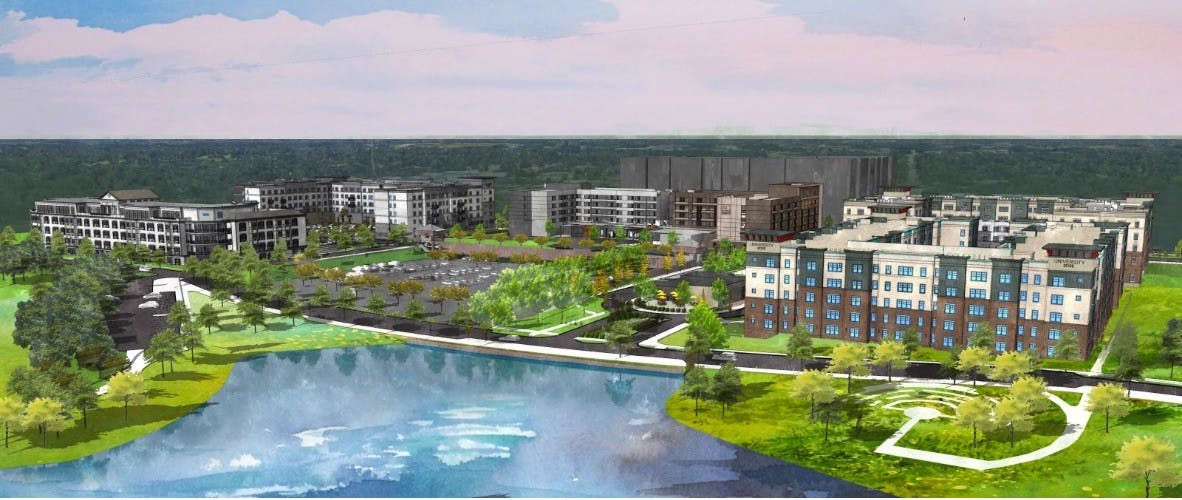The Michigan Strategic Fund, or MSF Board unanimously voted on May 19 to approve a brownfield proposal for the Red Cedar Project, a $256 million plan for a mixed-use development along the Michigan Avenue corridor.
The approval followed a March MSF vote to reject the request for incentives for the project. The group said the previously submitted work plan lacked adequate information to determine the final scope of the project or the resulting financial gap.
MSU Board of Trustees member Joel Ferguson and Frank Kass, partners in Lansing-based developer Continental/Ferguson LLC, spearhead the project. They lowered the number of student and market rate housing to decrease hard costs by $10 million in the revised plan, according to the project website.
According to a statement by Lansing Mayor Andy Schor, the $256 million redevelopment will create necessary hotels, recreation, retail and housing as well as strengthen the Michigan Avenue Corridor and bridge the gap between the Capitol and MSU's campus.
“This is positive news, especially with the unforeseen economic hardship that we’re experiencing as a result of the COVID-19 pandemic ," Schor said in the statement. "This continued investment will help drive Lansing forward and is a good sign to others looking to invest in the city."
The project will feature 792 beds of student housing, 181 market-rate apartments, two hotels and an assisted living and memory-care facility across the 35.5 acre development, according to the website.
A May 19 press release by Continental/Ferguson LLC said construction for the two dual-brand hotels — Hyatt House and AC Hotel by Marriott — is set to begin next year.
Work on the infrastructure will be completed first with construction for the market-rate apartments and senior living center beginning in late summer. Student housing is projected for completion by fall 2021.
According to the project website, plans also call for a restaurant, retail space and public park with a public amphitheater connected to Lansing River Trail.
According to the release, the MSF was the final approval needed for the state’s portion of the tax increment financing, or TIF. The Lansing Brownfield Redevelopment Authority approved the local portion of this plan in 2019.
TIFs allow developers of environmentally damaged, or brownfield sites to be reimbursed for eligible environmental costs through the site's increase in property tax value from the project, according to the Michigan Brownfield Redevelopment Program.
Executive Project Manager for Ferguson Development Chris Stralkowski said the state approval captures taxes generated by the investment and repays the developers for public infrastructure needs.
“We’re getting reimbursed for public infrastructure over a 30-year period and two-thirds comes from local and one-third comes from state, and that’s what happened yesterday,” Stralkowski said.
Of these new taxes, approximately $54 million dollars in generated tax revenue from the development will be set aside to be dedicated to public infrastructure under the LBRA Brownfield plan and through the State of Michigan, the website states. These funds will then be reimbursed to the developer who pays for the eligible public improvements upfront.
Costs to complete the development are estimated at approximately $281 per square foot, according to the website.
“The Red Cedar development will activate a long-vacant property into a vibrant, attractive mixed-use development that will bring density and vibrancy to a high-impact commercial corridor in Lansing,” Michigan Economic Development Corporation's Senior Vice President of Community Development Michele Wildman said in a statement. “We’re pleased to work with our partners to support this project and look forward to seeing the additional investment it will encourage in the area.”
Support student media!
Please consider donating to The State News and help fund the future of journalism.
Discussion
Share and discuss “Revised tax incentives approved for Lansing's $256 million Red Cedar Project” on social media.








